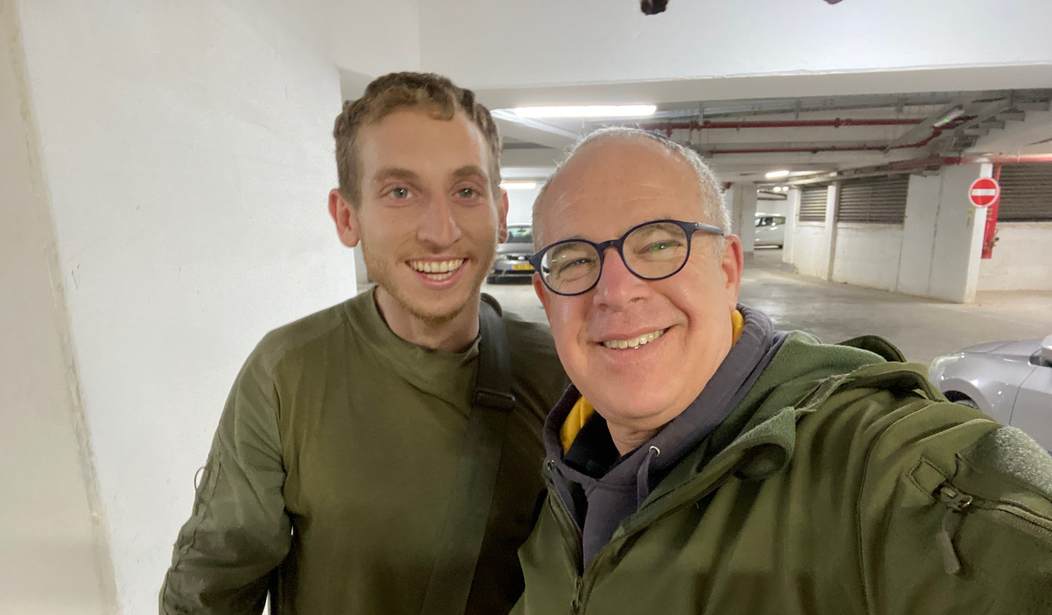That day, October 7, 2023, was terrifying. Nothing in my life could have ever prepared me for what happened, and what would come the following year, much less that we are still at war.
I woke up, along with my wife and kids, to an air raid siren about 50 yards outside our bedroom window. Especially if you’re sleeping, the sound is particularly piercing, loud, and jarring. That would be the first of four times we were sent to our bomb shelter that morning, as we heard the booms of rockets being intercepted, literally overhead.
Before dashing out of bed, I was in a state between sleep and being awake, lying in bed, thinking I was dreaming and interacting intellectually with my dreams. In my non-dream dream, I heard booms in the distance, thinking to myself that it made no sense. For some reason I thought it was tank fire which is all the more odd given that tanks are not deployed in our region. But I lay there, hearing the booms, thinking that something was going on but that I was in a dream. It was no dream, what I was hearing were the sounds of rockets exploding over Jerusalem 10-20 kilometers away.
As Orthodox Jews, because it was Shabbat, the Sabbath, the day of rest, we did not turn on our phones or TV, not believing that we were in any particular danger. Bomb shelters are standard construction in Israel. Ours is our oldest son’s room. The lights were off. Once pulling the steel shutters closed, we sat in the dark for several minutes each time, waiting for the sound of rockets being intercepted, or landing nearby, and the shrapnel to fall, before going back to “normal” in what would be one of the most abnormal days in the history of Israel.
Recommended
My youngest son was so bothered having to wake up and get out of bed each time, he decided it was easier to sleep in his brother’s bed and not have to be jolted out of his.
It’s not frequent, but it’s not impossible that rockets would be fired at us from Gaza. I would have loved to be a fly on my own wall that day, listening to and recording our conversation about what could be happening that terrorists in Gaza would be firing so many rockets so far away (minimally 45-50 miles). The speculation was wide ranging but none of us were right.
At about 4:00pm, my oldest son came into the house and informed us that he had been called up to his reservist combat unit. He was still dressed in more formal clothes as we do on Shabbat. He had 10 minutes to get all his gear together before being picked up. My wife and I scurried around to help him and send him off with food, not really absorbing what was happening. He reported that about 20 people had been killed. That’s all we knew.
Ten minutes later, I stood on our 7th story balcony watching him hop into a small black car and drive off. It sunk in then, and my heart sunk, knowing that something serious was going on. I choked up in fear. Just the first time of many.
Driving is also not something we do on Shabbat except in order to save lives. That day, our mostly Orthodox town’s streets had significant traffic with hundreds of others “going in” among the 300,000 people who were called up that day. In the coming days, tens of thousands more just showed up to join their units, even if they had not been called up.
“Rescue flights” operated from across the world, not bringing Israelis home from an earthquake or tsunami because they were in danger, but bringing home those who voluntarily showed up at the airport. In one case, the pilot overrode best practice and let young men and women coming home to serve to sit in the crew’s jump seats.
Knowing that our son was on his way to battle, we assumed that my son-in-law had also been called up. My wife and our youngest daughter walked 30 minutes to my daughter and son-in-law’s apartment in another neighborhood, expecting that she might need help with her three kids 4 and under.
Indeed, my son-in-law was also called up, but waited to go to his Gaza-border base because it was one of the ones invaded by terrorists. Had he gone there earlier, he’d have likely been killed along the way as major roads across southern Israel had been infiltrated by terrorists who shot everyone who came nearby.
Only after Shabbat did we turn on the news and begin to learn the depths of the horrors that had taken place. It was days before the death toll (1200) and how many hostages were taken (250+), and the vast destruction, and depth of injuries were known, days until all the terrorists were eliminated. It took weeks before the depth of the barbaric crimes committed that day became clear: gang rape, sexual mutilation, beheading, burning people alive, executing children in front of their parents and parents in front of their children. Despite the terrorists publishing and even live streaming and celebrating all this, it took days for evil people to begin to deny that the slaughter had even happened.
It was weeks before DNA and archeological specialists sifting through the ash that had once been a human being were able to find any way of identifying those incinerated.
When he was called up that day, my son was a newlywed, married for three months. He spent the next four months in reserves, getting leave for a day or two here and there. Most of that time, he was in Gaza, in combat. It took him months after his discharge to relate much of what he saw and experienced.
It was eerie, sad, and demonstrated a loss of control when he would text that he was going into Gaza using a shorthand developed, and would not have his phone. And conversely a huge relief to receive a text message when he’d come out of Gaza, knowing that he was not under fire.
For most of four months I rarely went out of the house especially when my wife was home. If we were to have received the now well-known “knock on the door” that he had been injured or worse, I could not leave my wife alone to have dealt with it. I needed to know, and to be sure that my kids, and mostly my daughter in law, was accessible. Nobody would think to go look for her in the bedroom in her parents’ home in which she grew up.
Per the Jewish tradition to buy flowers for Shabbat, when my son had access to his phone, he’d ask me to buy flowers for his wife. When he didn’t have his phone, I knew to do it. One Friday, delivering her flowers, my daughter-in-law’s sister saw me, smiled initially, and then her face went white, thinking that something terrible had happened.
In Gaza they were under fire from day one. Gidon was a father of six who was killed in combat, right alongside where my son was fighting at the time. At their first release from Gaza following Gidon’s death, the entire unit went to make a condolence call to Gidon’s widow. Since that day, there are hundreds of military widows and thousands of orphans.
We spent lots of time pitching in with our son-in-law to help our daughter and grandchildren, as grandparents did across Israel. Their neighborhood was virtually devoid of men as most had been called up, leaving young women to be responsible for their house, kids, and work, all worried about their husbands’ safety.
On Christmas eve, while distributing warm winter coats to soldiers in the Golan Heights, I met the rabbi of an artillery unit. Half an hour earlier, his commanding officer asked if he knew where they could get winter jackets. Four weeks later, we delivered 350 new jackets to the grateful soldiers, and got to inscribe love notes on some of the shells being prepared to fire at Hezbollah. The rabbi was my daughter and son-in-law’s neighbor, and his son was my grandson’s playmate. Divine providence and small world all in one.
Since that day, my grandchildren didn’t really know what was going on, but they knew something was not normal. They’ve experienced and displayed trauma, something that’s still evident and will likely be with them to some degree for the rest of their lives. That day, and the war that has ensured, is now part of our DNA individually and as a people.
We have all been to multiple funerals and houses of mourning – all close to home and all taking their toll. As people here, and friends overseas, instinctively ask when greeting someone, “How are you?” my reply has typically been, “No worse off than most Israelis.” Not in the category of having an immediate relative or close friend killed or kidnapped, I pray that it doesn’t get worse for us.
My oldest son lost friends from high school, as well as the young man he designated as the outstanding soldier from his unit when he was responsible for their training and induction. That hit hard and close to home.
One daughter has two close friends, both of whom lost brothers. They are not the same. How can they be?
Israel has always been a country where two degrees of separation is the rule. Everyone knows someone who knows someone who was either killed, kidnapped, fought, injured, etc.
In the immediate aftermath of that day, there’s been a profound sense of unity. It reminds me of the few weeks following 9/11. But ours is a trauma that is still going on.
We still don’t know the depth of how the multi-system failure that allowed that day to even happen, and some of the unity has frayed into political divisiveness. There’s been lots of suffering and loss, but many miracles.
One year since that day, we’re still in the midst of the trauma. In a sense, that day never ended.

























Join the conversation as a VIP Member